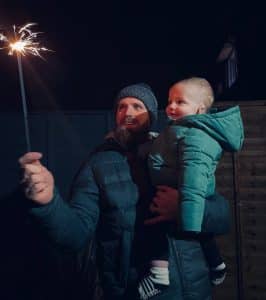Navigating the unexpected: The day we were told our new baby is deaf
For Deaf Awareness Week, Liam Dixon, Partnership Manager for our Wellbeing & Recovery Services, shares his personal journey from discovering his new baby was born deaf. He talks about how he has come to have a greater understanding of the misconceptions around deafness and the importance of prioritising mental wellbeing.
“Receiving news after his birth that our little boy was born with bilateral microtia, atresia with the likelihood that he was deaf, was a big thing to take on board amongst the euphoria of welcoming him into the world.
The first few weeks were challenging, with a real sense of uncertainty and unknown while waiting for hearing assessments with the audiology team – could he hear us? Would his development be affected?
After five weeks, and multiple appointments to assess the severity of hearing loss, we had answers and clarity. It was moderate bilateral hearing loss, but with all the inner ear structure to be able to receive sounds through two bone conducting devices. The moment we were told there were options to aid his hearing, a giant weight was lifted off our shoulders.
By seven weeks old he had his first bone anchor hearing aid (BAHA) fitted, giving him 80% hearing ability. The remaining device was fitted at approximately eight months old.
Despite all the unknowns, and what felt like a lifetime of waiting for definitive answers, we had a pathway forward which was our aim. Our little boy is flourishing and hitting all of the developmental milestones expected for his age because of very early intervention.
Shattering misconceptions
Being a father to a deaf child has opened my eyes to many misconceptions related to deafness. I now have a stronger understanding that deafness shouldn’t define a person, and should be viewed as a characteristic like the colour of someone’s hair for example.
A very common question I am asked is ‘will you be learning sign language?’ or noticing people raising their voices more when interacting. From personal experiences being part of my child’s early journey, there has been so much to learn and understand, such as these common misconceptions:
- There are multiple types of deafness, and differing levels of severity. One approach isn’t suitable for all.
- Not all deaf people use sign language or lip-reading to communicate. Each individual may need different approaches.
Fostering inclusion and mental wellbeing
With many misconceptions evident, isolation and assumptions around deafness can be detrimental to someone’s mental wellbeing. Here are a couple of the main barriers deaf people face:
- Lack of awareness – The first and fundamental barrier. Sometimes people don’t know how to act or create an inclusive listening environment, leading to feelings of isolation and exclusion for deaf individuals. This lack of awareness and accommodation can contribute to mental health challenges such as anxiety, low self-esteem, and depression.
- Social attitudes – negative social attitudes, stereotypes, and prejudice are harmful for deaf people and can create isolation, leading to worsening mental wellbeing. The stigma and discrimination faced by the deaf community can deeply impact their sense of belonging, self-worth, and overall psychological well-being, increasing the risk of mental health issues like depression and anxiety disorders.
Our journey has taught us to celebrate deafness as part of the wonderful diversity of human life. While misconceptions persist, fostering inclusion and positive mental wellbeing for the deaf community is crucial. By promoting open dialogue, education, and challenging biases, we can create a more compassionate world where every child thrives. Our story underscores the profound joy in wholeheartedly embracing diversity.

Other useful links
